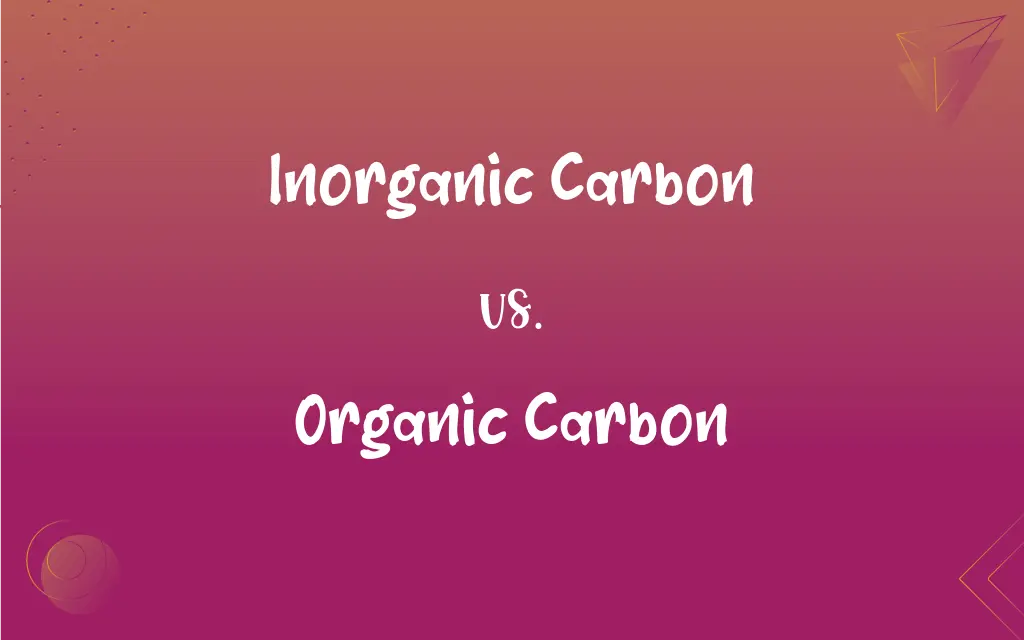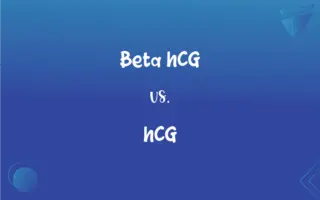Inorganic Carbon vs. Organic Carbon: What's the Difference?
Edited by Aimie Carlson || By Harlon Moss || Published on February 20, 2024
Inorganic carbon comprises carbon compounds not bound to hydrogen (e.g., CO2), while organic carbon consists of carbon atoms bonded to hydrogen (e.g., glucose).

Key Differences
Inorganic carbon refers to carbon found in compounds that lack carbon-hydrogen (C-H) bonds, such as carbon dioxide (CO2) and carbonates. Organic carbon, on the other hand, is present in compounds that contain carbon bonded to hydrogen, typical of living organisms and their products, like glucose and cellulose.
In the natural environment, inorganic carbon is primarily found in minerals, atmospheric gases, and dissolved in water. Organic carbon is essential in biological molecules, forming the backbone of DNA, proteins, carbohydrates, and lipids.
Inorganic carbon compounds are often associated with geological and atmospheric processes, such as volcanic emissions or the carbonation of rocks. Organic carbon compounds are predominantly products of biological processes, like photosynthesis and decomposition.
The cycle of inorganic carbon includes processes like weathering and the carbonation reaction, which are crucial for maintaining the Earth's climate. The organic carbon cycle involves the assimilation of CO2 by plants and its return to the atmosphere through respiration and decay.
In terms of chemical properties, inorganic carbon compounds are usually less complex and can be ionic or covalent. Organic carbon compounds are characterized by their large variety, complexity, and the presence of functional groups that determine their chemical behavior.
ADVERTISEMENT
Comparison Chart
Bonding
Lacks carbon-hydrogen (C-H) bonds
Contains carbon-hydrogen (C-H) bonds
Source
Found in minerals, gases, and dissolved in water
Found in biological molecules and living organisms
Role in Nature
Involved in geological and atmospheric processes
Central to biological processes and life forms
Cycle
Part of weathering and carbonation reactions
Involved in photosynthesis, respiration, and decomposition
Chemical Complexity
Generally less complex, ionic or covalent
More complex with various functional groups
ADVERTISEMENT
Inorganic Carbon and Organic Carbon Definitions
Inorganic Carbon
Often present in the Earth's crust and oceans as carbonates.
Bicarbonate ions in the ocean represent inorganic carbon.
Organic Carbon
Carbon found in compounds with carbon-hydrogen bonds.
Glucose, a sugar molecule, is a form of organic carbon.
Inorganic Carbon
Inorganic carbon is a key component in the Earth's carbon cycle.
Atmospheric CO2, an inorganic carbon source, is vital for plant photosynthesis.
Organic Carbon
Predominantly derived from living organisms or their remains.
Fossil fuels, like coal and oil, are rich in organic carbon.
Inorganic Carbon
Carbon found in compounds without carbon-hydrogen bonds.
Carbon dioxide (CO2) in the atmosphere is a form of inorganic carbon.
Organic Carbon
Organic carbon compounds are diverse and complex.
Proteins, essential for cellular function, are made of organic carbon.
Inorganic Carbon
Inorganic carbon forms part of minerals and rocks.
Limestone, primarily composed of calcium carbonate, contains inorganic carbon.
Organic Carbon
Organic carbon is fundamental to life, forming biological molecules.
DNA, which carries genetic information, consists of organic carbon.
Inorganic Carbon
It is typically less complex and more stable chemically.
Carbonates in soil are stable forms of inorganic carbon.
Organic Carbon
Involved in biological processes like photosynthesis and respiration.
During photosynthesis, plants convert CO2 into organic carbon.
FAQs
What characterizes organic carbon?
Carbon in compounds with carbon-hydrogen bonds, found in living matter.
Where is inorganic carbon commonly found?
In atmospheric gases, minerals, and dissolved in water.
How does inorganic carbon participate in the carbon cycle?
Through geological and atmospheric processes like weathering.
What is inorganic carbon?
Carbon in compounds lacking carbon-hydrogen bonds, like CO2.
What is a common source of organic carbon?
Biological organisms and their products, like plants and fossil fuels.
What role does organic carbon play in the carbon cycle?
It's central to biological processes, like photosynthesis and decomposition.
How do humans impact the inorganic carbon cycle?
Through activities like burning fossil fuels, increasing atmospheric CO2.
How are fossil fuels related to organic carbon?
They are concentrated forms of organic carbon from ancient life.
Can inorganic carbon be used in industrial processes?
Yes, for example in the production of cement and plastics.
How do living organisms use organic carbon?
As a building block for DNA, proteins, and other essential molecules.
What is an example of an organic carbon compound?
Glucose, a simple sugar.
How is organic carbon essential for food chains?
It forms the basis of nutrients passed through food chains.
Can inorganic carbon become organic carbon?
Yes, through processes like photosynthesis in plants.
Are inorganic carbon compounds stable?
Generally, they are more stable and less complex.
What is an example of an inorganic carbon compound?
Carbon dioxide (CO2) in the air.
Do oceans store inorganic or organic carbon?
Both, as dissolved CO2 (inorganic) and marine life (organic).
Can inorganic carbon be toxic?
In certain forms and concentrations, like CO2 in high levels.
What happens to organic carbon when organisms die?
It's often released back into the environment or becomes fossilized.
Is organic carbon important for soil fertility?
Yes, it's crucial for soil health and plant growth.
Is the study of organic carbon important for understanding climate change?
Absolutely, as it's integral to the greenhouse effect and carbon sequestration.
About Author
Written by
Harlon MossHarlon is a seasoned quality moderator and accomplished content writer for Difference Wiki. An alumnus of the prestigious University of California, he earned his degree in Computer Science. Leveraging his academic background, Harlon brings a meticulous and informed perspective to his work, ensuring content accuracy and excellence.
Edited by
Aimie CarlsonAimie Carlson, holding a master's degree in English literature, is a fervent English language enthusiast. She lends her writing talents to Difference Wiki, a prominent website that specializes in comparisons, offering readers insightful analyses that both captivate and inform.































































